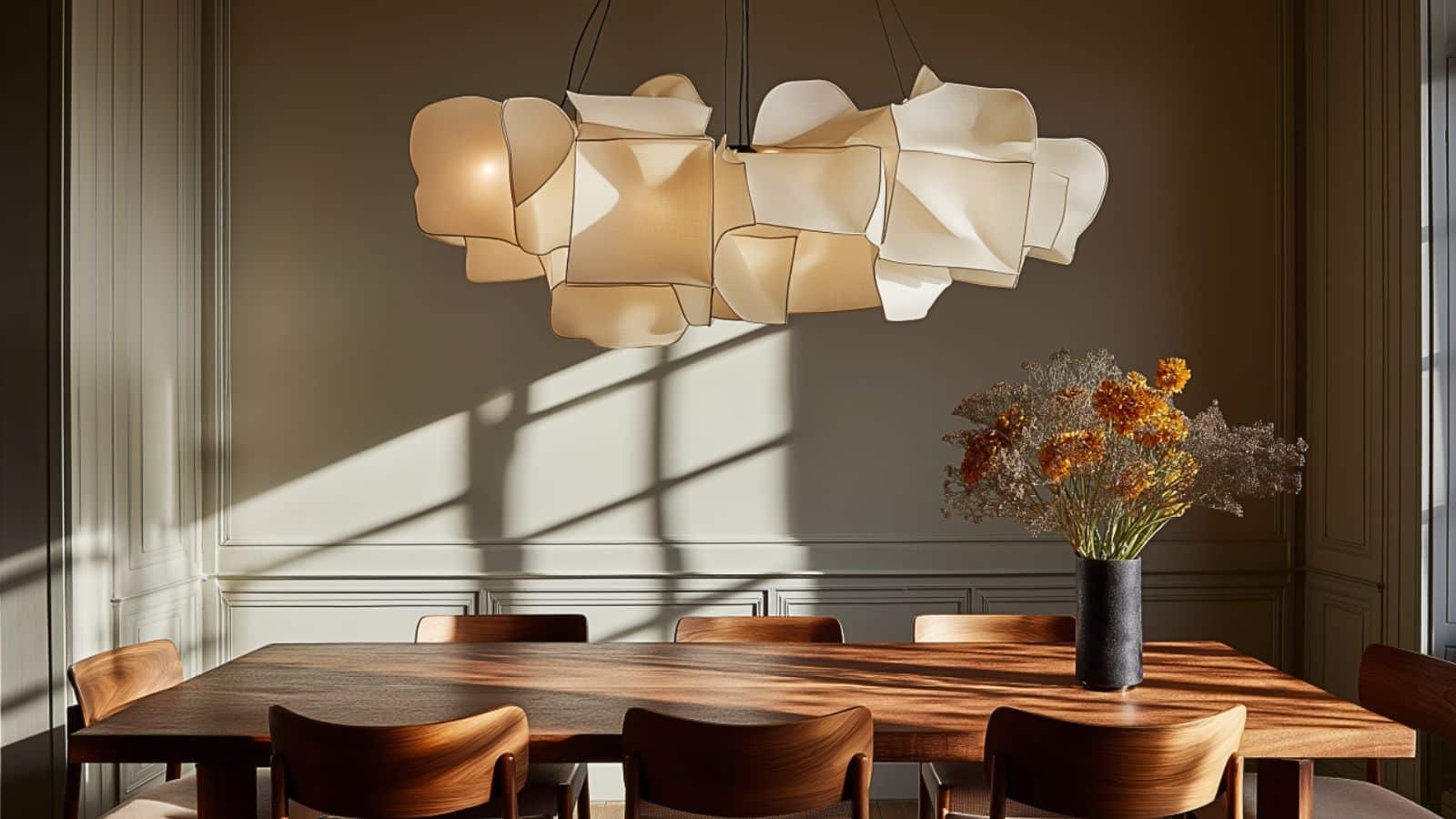Statement Chandeliers: Dining Room Light Fixtures That Elevate Space with Elegance and Drama
Table of Contents
Lighting is one of the most overlooked design elements in the home, yet it has the power to completely transform a room. Nowhere is this more evident than in the dining room. Often the heart of the home, your dining area deserves more than basic overhead lighting—it deserves a centerpiece that commands attention. Enter the statement chandelier: a dining room light fixture that does more than illuminate. It defines the space, sets the mood, and speaks volumes about your style.
According to interior design forecasts, 2025 is all about bold lighting with personality. Designers and homeowners alike are gravitating toward sculptural forms, rich finishes, and fixtures that serve as functional art. In the dining room, the chandelier is no longer just a necessity—it’s the statement-maker.
This guide will walk you through everything you need to know about incorporating statement chandeliers into your dining room design. From choosing the right size and shape to exploring materials, styles, finishes, and placement, we’ll help you find the perfect light fixture to elevate your space—whether you’re working with a modern loft, a classic formal dining room, or a cozy breakfast nook.
Understanding What Makes a Chandelier a Statement Piece
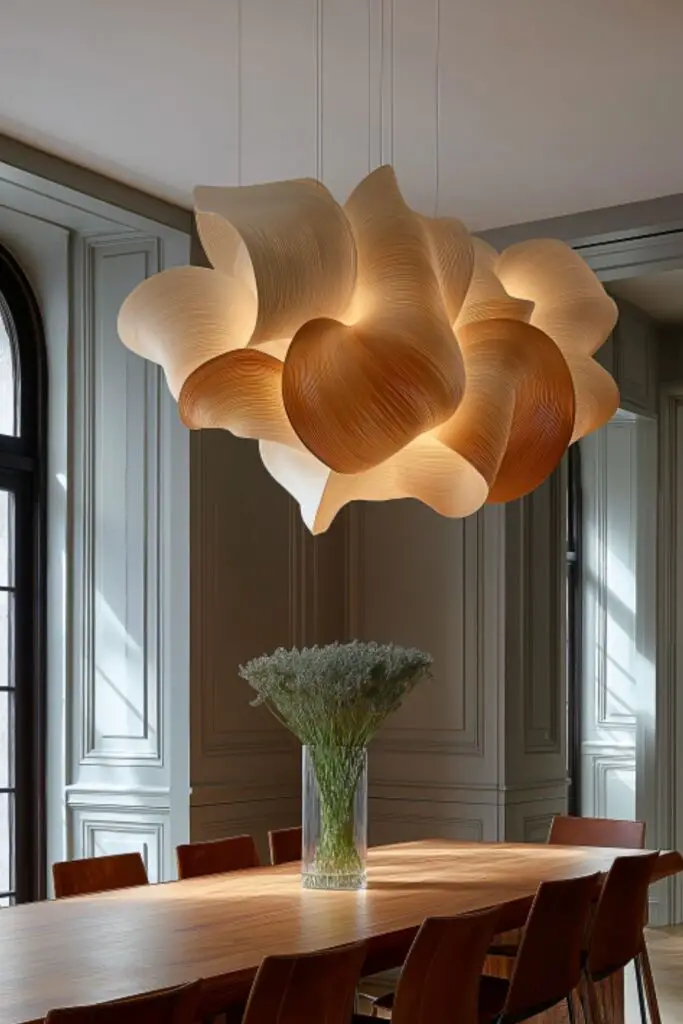
Not all chandeliers are created equal. A statement chandelier isn’t just large or ornate—it’s thoughtfully chosen to be the focal point of the room. These fixtures blend scale, silhouette, material, and placement in a way that commands attention while complementing the rest of the décor.
The secret lies in striking a balance between visual impact and harmony. A chandelier can be dramatic without overwhelming. It might feature bold geometry, unique materials, or unexpected scale. Think cascading glass orbs, hand-hammered metals, oversized linen shades, or even minimalist LED sculptures.
But a statement piece doesn’t necessarily mean ultra-modern. It can be a vintage crystal fixture in an eclectic setting or a rustic wood-and-iron design in a farmhouse space. The key is intentionality—your chandelier should feel like a curated design decision, not an afterthought.
Key Characteristics of Statement Chandeliers
| Design Element | Description | Style Impact |
|---|---|---|
| Size | Scaled to the table and room size | Ensures presence without overpowering |
| Shape | Sculptural or architectural | Adds visual interest |
| Material | Unique or high-contrast finishes | Brings texture and tone |
| Light Distribution | Balanced brightness and direction | Enhances ambiance and functionality |
Choosing the Right Size and Proportion for Your Dining Room
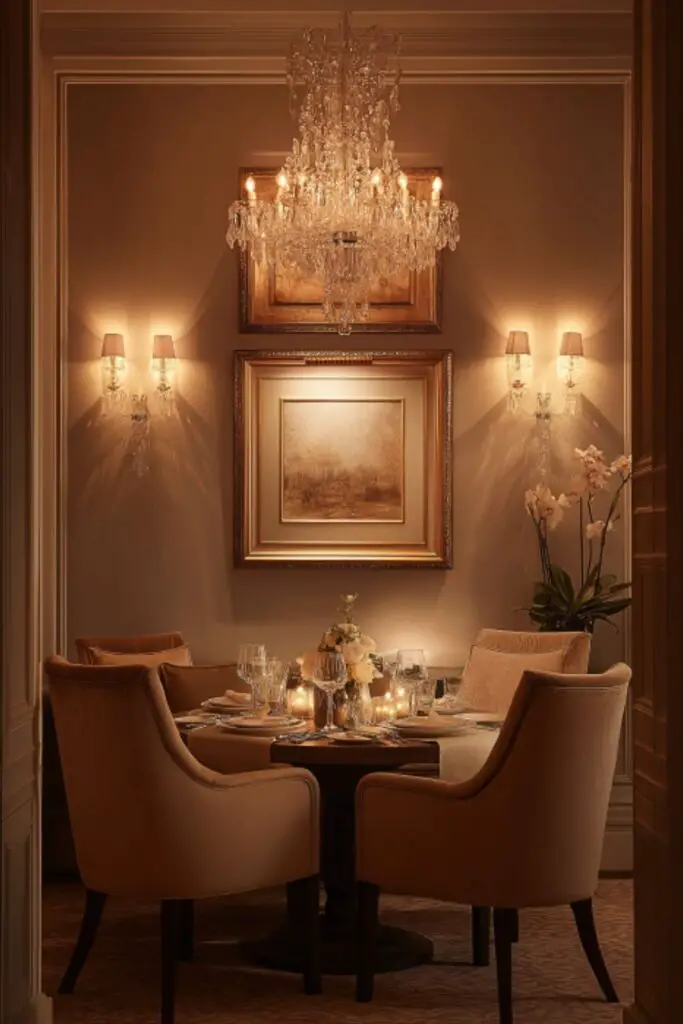
Selecting the correct size for your chandelier is critical to achieving that elevated, designer look. A fixture that’s too small can feel underwhelming, while one that’s too large might crowd the space or disrupt flow. Proportion is everything.
Start by measuring the dimensions of your dining room. Add the length and width (in feet) together and convert that sum into inches—this number gives you a good starting diameter for your chandelier. For example, a 12′ x 14′ room equals 26 inches in chandelier diameter.
Height is another key factor. Your chandelier should hang about 30–36 inches above the table in rooms with an 8-foot ceiling. For every foot beyond that, raise the fixture 3 inches. This ensures the light doesn’t obstruct views but still creates a cozy, defined glow over the table.
If you’re working with a round table, choose a round or ring-style fixture. For a long, rectangular table, consider linear chandeliers or multiple pendants arranged in a row.
Size and Proportion Cheat Sheet
| Room Size (Feet) | Recommended Fixture Diameter (Inches) | Hanging Height (From Table) |
|---|---|---|
| 10 x 10 | 20 inches | 30–34 inches |
| 12 x 14 | 26 inches | 30–36 inches |
| 14 x 16 | 30–36 inches | 33–39 inches |
| Large Rectangular | Linear chandelier or double pendants | Even spacing across table |
Popular Chandelier Styles for Every Dining Room Look
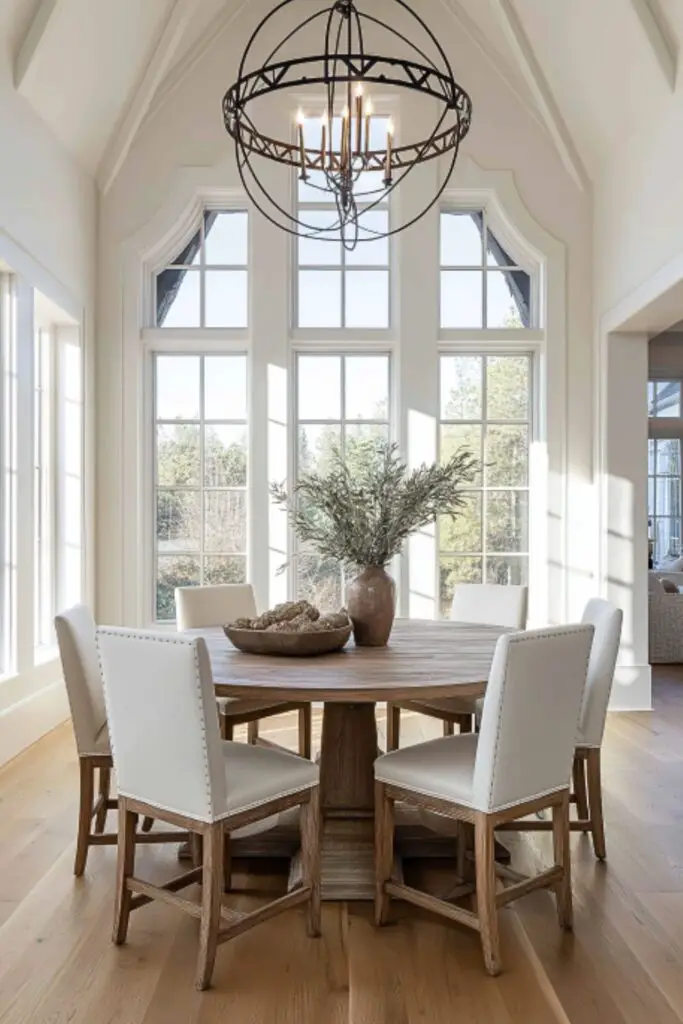
From modern minimalism to vintage glam, the world of statement chandeliers is rich with variety. Choosing the right style helps set the tone for the entire dining space. The key is to find a chandelier that aligns with your existing décor while introducing an element of contrast or surprise.
1. Modern and Sculptural
Often minimalist in palette but bold in form, modern chandeliers might feature brass arms, LED tubes, or globe lights arranged in asymmetrical formations. These are great in contemporary spaces or to add a twist in traditional settings.
2. Crystal and Glamorous
Classic crystal chandeliers are timeless—but the new wave includes smoked glass, bronze trims, and tiered silhouettes that feel fresh and sophisticated.
3. Rustic and Organic
Wood, rope, and iron make up this cozy category, ideal for farmhouse, coastal, or bohemian interiors. Think wagon wheel shapes, exposed bulbs, and earthy finishes.
4. Industrial and Mixed-Material
For an edgy, eclectic space, opt for mixed metals, matte finishes, or blackened steel. Edison bulbs or cage-style structures offer vintage character.
Style Overview Table
| Chandelier Style | Ideal For Spaces | Signature Materials |
|---|---|---|
| Modern Sculptural | Contemporary or minimalist homes | Brass, matte black, acrylic |
| Crystal/Glam | Classic, formal dining rooms | Crystal, glass, chrome |
| Rustic Organic | Farmhouse or boho homes | Wood, jute, aged iron |
| Industrial | Eclectic or loft-style settings | Mixed metals, Edison bulbs |
Lighting Functionality and Mood Control
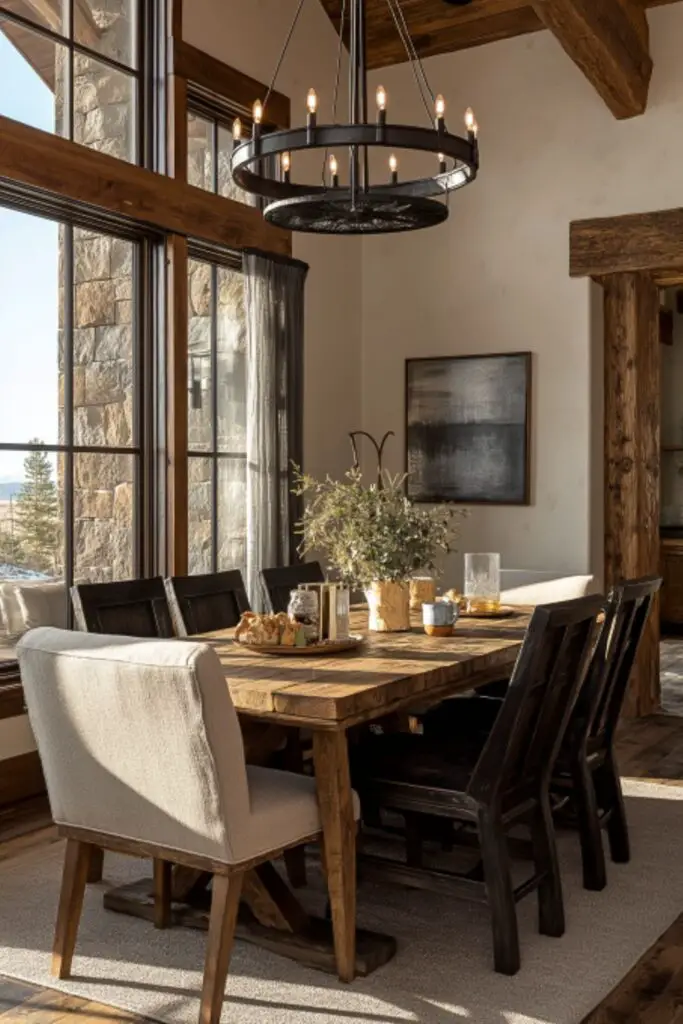
While aesthetics are important, your dining room chandelier also plays a critical functional role. Lighting in this space needs to strike a delicate balance: it must be bright enough for meals but warm enough to create an intimate atmosphere.
Start with the type of bulb. Look for bulbs between 2700K and 3000K—these emit a warm, golden glow ideal for dining spaces. Avoid cool white or daylight tones, which can feel sterile and too intense.
Dimmers are an essential upgrade. They allow you to shift the mood from brunch to dinner party, adjusting the light level without sacrificing style. Many modern chandeliers are compatible with smart home systems, offering remote and programmable control.
Consider layered lighting as well. Pair your chandelier with wall sconces, recessed lighting, or table lamps in nearby zones for depth and flexibility. This layering also prevents harsh shadows and enhances the room’s overall ambiance.
Lighting Performance Tips
| Lighting Element | Ideal Choice | Purpose |
|---|---|---|
| Bulb Color Temperature | 2700K–3000K (warm white) | Cozy, flattering light |
| Dimmable Feature | Standard or smart dimmers | Adjustable ambiance |
| Layered Fixtures | Wall sconces, table lamps nearby | Visual depth, task lighting |
| Bulb Type | LED filament or frosted bulbs | Energy-efficient, gentle glow |
How to Style the Room Around Your Statement Chandelier
Once you’ve chosen the perfect statement chandelier, the next step is integrating it into the room’s overall aesthetic. The right styling can amplify your light fixture’s impact and ensure it feels cohesive with the space.
Start from the top down. If your chandelier is ornate or oversized, keep the table below it simple—perhaps a wood finish or a monochromatic scheme that allows the chandelier to shine. Conversely, if your chandelier is minimal, use the table setting or chairs to introduce color and texture.
Symmetry is powerful. Center the chandelier precisely above the table, especially if your dining room has architectural features like crown molding or ceiling medallions. This balance brings harmony and elegance to the room.
Coordinate finishes. While everything doesn’t have to match, echoing the chandelier’s materials elsewhere helps unify the space. For example, pair a brass chandelier with drawer pulls, mirror frames, or candle holders in similar finishes.
Anchor with a rug. A rug under the table defines the dining zone and helps ground a floating chandelier. Choose patterns and colors that complement both your furniture and lighting.
Styling Coordination Table
| Feature to Coordinate | How It Ties to Chandelier | Styling Advice |
|---|---|---|
| Dining Table | Contrast or complement fixture | Choose shape to match chandelier |
| Chairs and Textiles | Echo finishes or tones | Add texture with linen or velvet |
| Rug | Frames both table and chandelier | Use size to balance visual weight |
| Wall Art or Mirrors | Repeats shape or material | Round mirror for circular chandelier |
Mixing Chandeliers with Architectural Features
If your dining room has standout architectural elements—like exposed beams, tray ceilings, or tall windows—your chandelier should enhance, not compete with them. In these cases, it’s about balance and scale.
Use the architecture as a guide. For example, a coffered ceiling can perfectly frame a round chandelier, while a vaulted ceiling may suit a vertical, multi-tiered fixture. Match the shape and lines of the chandelier to echo those of the room for a harmonious feel.
In rooms with ornate detailing, choose simpler chandeliers that blend in. In minimalist rooms, your chandelier can take center stage without distraction.
Architectural Matching Tips
| Room Feature | Ideal Chandelier Style | Design Strategy |
|---|---|---|
| Coffered Ceiling | Circular or radial chandelier | Centers beautifully within frame |
| Vaulted Ceiling | Tiered or tall fixtures | Fills vertical space gracefully |
| Rustic Beams | Wood or iron chandeliers | Echoes texture and tone |
| Tall Windows | Linear fixtures | Aligns with horizontal lines |
Conclusion
A well-chosen chandelier does more than light a room—it defines it. In the dining room, where atmosphere and aesthetics go hand in hand, investing in a statement chandelier is one of the most impactful design decisions you can make. From choosing the right size and shape to aligning it with your style, mood, and architecture, each choice contributes to a space that feels intentional, elevated, and uniquely yours.
Whether you’re drawn to sculptural modern pieces, timeless crystal forms, or earthy organic designs, the perfect chandelier doesn’t just illuminate dinner—it sets the entire tone for the space. Let it be the conversation starter, the design anchor, and the light that draws people in.

